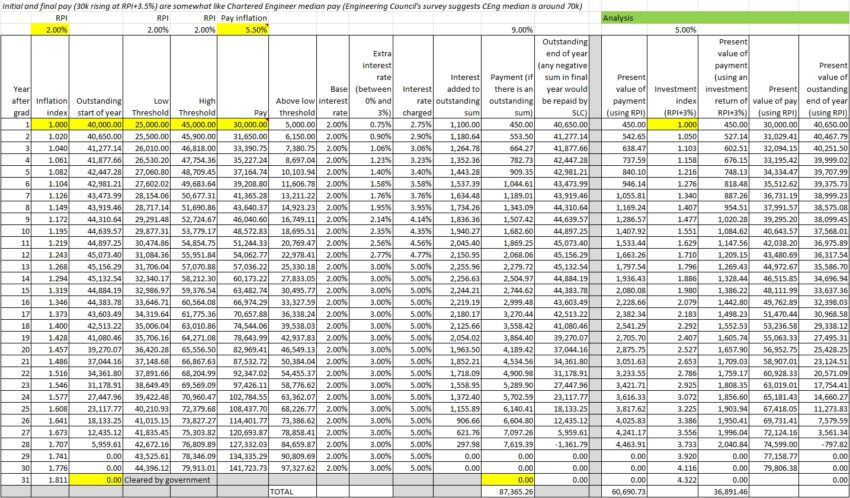Student Loan Statistics in the UK
Over 616,535 students took out student loans in the UK in 2020-21, totaling more than £14 billion. That's a significant amount of money! This article will dive into some key UK student loan statistics and trends.
How Many Students Borrowed in 2020-21?

Source: co.uk
In the 2020-2021 academic year, a large number of students in the UK – over 616,535 – borrowed more than £14 billion in student loans. This highlights a massive financial commitment related to pursuing higher education. The sheer number involved really hits home how crucial student loan access is in the UK.
What is the Average Student Loan Debt?
The average student loan debt at graduation is roughly £35,000. It's quite a substantial figure, reflecting the rising costs of university studies. Thinking about repaying that much debt after finishing your course definitely makes the whole student experience feel like a longer journey with a bit of extra baggage!

Source: yumpu.com
Top 3 Borrowing Trends by Students
Analyzing student loan trends in the UK reveals interesting facts and insights. A few prominent trends stand out:
- Number of loan applications: There has been a slight dip in student loan applications, which probably stems from tuition changes or the costs associated with studying (not knowing these figures).
- Higher education demand: Surprisingly, more students from underprivileged backgrounds now apply to universities, signifying an increase in student applications despite the overall dip in applications in recent years.
- Cost of living adjustments: The total loan amount can change based on costs like course fees, living expenses, and lifestyle factors.
These trends, observed through student loan application data and other relevant insights, might lead to specific and focused actions. It's useful information when trying to plan or adjust personal financial situations.
UK Student Loan Demand and Supply
Student loans in the UK are a significant part of the higher education system. Understanding the demand and supply is key for students, policymakers, and anyone interested in education.
Has Loan Demand Changed Recently?
Recent reports show a slight drop in applications for student loans. This might be because the cost of university is less now than before, which is helping make student loans uk slightly less necessary. Costs of living might also be an important factor. But another trend is also increasing interest.
Who Is Applying For Student Loans Now?
More students from disadvantaged backgrounds are now applying to university. This shows there's still a good demand, just from a slightly different group of people, possibly because of different needs. This shift in applications for student loans uk shows how important education can be for various backgrounds.

Source: parliament.uk
2 Key Factors of Recent Trends Analysis
Two main factors appear to be affecting the recent student loans uk trends:
-
Reduced fees and costs: The fees for universities in the UK have probably come down a little recently, or costs related to everyday life are more manageable for some people. This makes applying for student loans uk possibly a little less urgent.
-
Growing demand: Even with the decline, there is still growing interest in going to university, and we can see that in the applications from disadvantaged students rising! This means student loans uk still are needed and desired in many cases.

Source: thecollegeinvestor.com
Pricing of UK Student Loans
Understanding the costs of student loans in the UK is important for planning. This section looks at tuition fees and interest rates for student loans uk.
What is the Annual Undergraduate Tuition?
The standard tuition fee for undergraduates in the UK is £9,250 per year. This is a significant amount to pay for higher education in the UK. Knowing this fee is important when thinking about student loans uk options and how it might relate to income potential later in life.
What Interest Rates Apply to Loans?
Interest rates for student loans uk can be a bit confusing. For student loans in the UK, the interest rate depends on how quickly you repay your loan. A good repayment schedule leads to a lower 4.5% interest rate, or otherwise a higher 9.3%. These differences can significantly impact your overall debt amount.
Three Key Cost Considerations
Paying for college in the UK includes several elements:
-
Tuition: The base amount is £9,250 per year. It's one big part of the overall cost for the student.
-
Interest Rates: Interest rates in student loans uk, varying from 4.5% to 9.3% on loans based on repayment terms. This matters greatly for planning long-term financial well-being, in case student loans uk are borrowed from various programs in the UK
-
Loan Amount/Overall Cost: Depending on the program of study, length of studies, and daily living costs, borrowing through student loans uk may require consideration and preparation.
Student Loan Historical Trends in the UK

Source: twimg.com
Understanding how student loan debt in the UK has changed over time is helpful. This section explores the historical trends in student loans uk.
How Has Debt Changed Since 2004?
Student loan debt in the UK has been going up since 2004. This is mostly because the tuition fees at universities have increased. It's like the debt has been slowly rising up a hill.
Which Year had Maximum Student Loan Debt?
Unfortunately, knowing the exact year with the highest student loan debt isn't available in the provided info.
2 Reasons Why Debt is Growing
Two main reasons explain the rise of student loan debt in the UK:
-
Tuition Fees: Rising tuition fees at UK universities have made education more expensive for students, which has in turn increased the overall need to borrow money. As the price for studying rises, so does the debt needed for that education!
-
More Students Borrowing: More graduates than ever (over 2 million) are taking student loans. More people wanting to study is meaning higher overall numbers. Each year there are many more people in need of a student loan uk.
These factors show why student loans uk is so crucial in higher education systems and how significant of a responsibility borrowing for it entails for UK student life.
Expert Opinions on Student Loans UK
Different people have different ideas about student loans uk. Let's see what some experts think.
Minister's View: System's Value
The UK government official in charge of universities says the current student loan system is good. It's meant to help more people go to university, which is great.
NUS: Burden and Loan Concerns

Source: twimg.com
The National Union of Students (NUS) thinks student loans uk create a heavy burden for many graduates. They feel it's tough to pay back those student loans uk. Over 2 million graduates have borrowed over £20,000 each. This big number highlights the high student loan debt many people are facing.
Student Perspectives: Future Impact
Students have to consider how student loans uk will affect their futures. It's important for them to see how these loans will weigh in after graduating.
Government Response: Planned changes?
There's no clear answer from the government yet about changing student loans uk plans. The system has helped a lot of students, and the government may think these adjustments aren't needed now.
Key Takeaways: Navigating UK Student Loans
Student loans uk are a big part of going to university in the UK. This section gives helpful advice for navigating the student loans uk system.
Is Borrowing Right for Me?

Source: pearsonpte.com
Thinking about student loans uk? You should compare your future job salary to how much debt you might take on. Student loans uk could affect your future money for a long time. Weighing those two options is very important.
What are Other Funding Options?
Besides student loans uk, look at other ways to pay for university. Grants and scholarships from the government or private organizations could save you a lot of money.
Managing Debt Effectively After College
After you finish school, it's important to plan for student loans uk. Getting advice on managing student debt early is super helpful. This lets you understand all your loan details and plan how to pay it back in a manageable way. Look at resources that provide financial advice, which is really smart for your finances!

